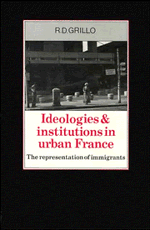Book contents
- Frontmatter
- Contents
- List of tables, figures, and maps
- Acknowledgments
- Glossary of abbreviations and acronymns
- 1 Introduction
- 2 Immigrants in France and in Lyon
- 3 Two modes of discourse: immigrés and étrangers
- 4 Urban development and the problems of housing: the “bachelors”
- 5 Housing and the “problems” of immigrant families
- 6 North African women and the French social services
- 7 In the schools and on the streets
- 8 Language
- 9 Work
- 10 “The strike is like a school”
- 11 The representation of problems and the problem of representation
- 12 Conclusion: institutional and ideological structures
- Appendix: The French school system
- Bibliography
- Maps
- Index
12 - Conclusion: institutional and ideological structures
Published online by Cambridge University Press: 27 August 2009
- Frontmatter
- Contents
- List of tables, figures, and maps
- Acknowledgments
- Glossary of abbreviations and acronymns
- 1 Introduction
- 2 Immigrants in France and in Lyon
- 3 Two modes of discourse: immigrés and étrangers
- 4 Urban development and the problems of housing: the “bachelors”
- 5 Housing and the “problems” of immigrant families
- 6 North African women and the French social services
- 7 In the schools and on the streets
- 8 Language
- 9 Work
- 10 “The strike is like a school”
- 11 The representation of problems and the problem of representation
- 12 Conclusion: institutional and ideological structures
- Appendix: The French school system
- Bibliography
- Maps
- Index
Summary
In this final chapter I shall attempt to place the material raised by this book in a wider perspective, taking up a number of points raised by the analysis of institutions and ideologies. I will also try to set the data in a comparative framework, drawing attention to similarities and differences between France and Britain.
METHODOLOGICAL PREMISES
When I have presented some of my findings to audiences of anthropologists, some participants have invariably sought to divert discussion from the French to the immigrants, as if they were considered the only appropriate field for anthropological inquiry. Indeed, on one occasion it was asked: “But what do the real people think?” I have suggested elsewhere (Grillo 1980a:4) that in the division of labor in the social sciences, anthropologists have allowed themselves to be accorded the role of expert in certain domains only, of which “immigrants” is one. To accept that role, however, is to ignore something that is both a methodological premise and an ethnographic fact: that the social and economic position of immigrants must be seen, in large part, in terms of their situation within the society to which they have migrated. Whether that situation may be described as “determined by,” or a “reflection of,” or a “response to,” or “integration with,” or even as “autonomous within” that society is a separate question.
- Type
- Chapter
- Information
- Ideologies and Institutions in Urban FranceThe Representation of Immigrants, pp. 281 - 301Publisher: Cambridge University PressPrint publication year: 1985

